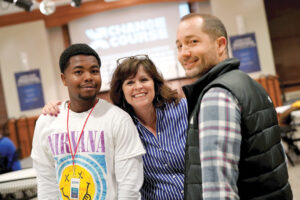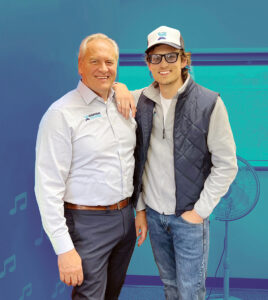Second chances
4/5/2023
Todd Cappel, right, with fellow Change Course leader Jordan Garrett and Director of Programs Karin Johnson. Photo submitted
When Todd Cappel finished serving nine months in prison, he hesitated to apply for work. Thankfully, unlike many others emerging from incarceration, he had plenty of community support.
“Part of the whole recovery process is being honest,” he said. “So, once I got out, I was a little nervous about getting out in the community and what people would say, but they were nothing but supportive.”
Prior to his felony charge, Cappel had graduated from Iowa State University and spent 14 years in sales: a career he had imagined himself retiring from. After prison, he focused on his service work and recovery — but his career was at a standstill.
“I just was stuck and afraid to apply to any sort of positions, and I didn’t want to just go into an entry-level position with my education and experience. I was just afraid to get my resume out there because I had that felony on my record,” he said. “I needed some routine in my life. Because I’m not one that likes to sit around. And I knew I needed some sort of help to do it and the confidence to do it.”
Cappel found help in Change Course, just one piece in a network of organizations serving citizens reentering their communities from prison.
Through Change Course, Cappel has submitted job applications, practiced interviews and grown his career network. He’s completed a 30-hour OSHA training course and is looking to enter the construction industry.
“The ultimate goal is employment — and to be happy, start my life over. Because I knew going to jail that it was going to be a fresh start for me. And along the way, I really realized: The best is yet to come.”

Joseph Johnson, left, was inspired to create Change Course after his own experience with incarceration. He serves alongside his son, Bradford. Photo submitted
Change Course
Learn more at… change-course.org
Change Course launched last year, but its roots go back to 1995, when founder Joseph Johnson began a sentence in a federal prison camp in South Dakota.
“I was always one that grew up thinking everybody in the United States can make it — because if you live in the U.S., everybody has the opportunity to succeed. I met some men that would change my view of that.”
In prison, Johnson heard story after story from other inmates of dysfunctional upbringings, traumatic life experiences, and unsupportive communities.
“I could see men come back to prison while I was there, and I’d ask them why they came back. The most consistent answer was, ‘Nobody would give me a job. Nobody would give me an opportunity. I had to survive, so I’d steal and sell drugs again.’ ”
When Johnson finished his sentence, he was embraced by his family and church community. He found a job running a company — at the suggestion of the very person he had wronged, leading to his conviction. The company owner hesitated: Johnson was not only a felon, he had 18 months of remaining probation.
“But they still took a chance on me because of the recommendation of the community around me that said, ‘Take a chance; trust me,’ ” Johnson said.
He spent the next 25 years at the executive level in small businesses, seeing great success. Yet, in the back of his mind, a calling persisted. Since incarceration, Johnson had long dreamed of establishing a prison reentry center that not only provided practical career and personal development skills, but a loving and healthy community.
“I was waking up at night thinking about this training center, and I felt like: It’s time. We need to do it now.”
So, Johnson retired and, alongside wife, Karin, and son, Bradford, launched a nonprofit near Drake University. Change Course welcomed its first cohort last November and hopes to see at least 10 participants graduate this summer. By 2025, they hope to graduate three classes of 50 leaders annually.
“Our participants we call ‘leaders,’ because they’re the leaders of their lives,” Johnson explained.
The program lasts six months, starting with eight weeks of personal development. After this, leaders embark on their chosen career path. The nonprofit partners with schools and organizations like DMACC, Penn Foster College and Broadlawns Medical Center to help leaders obtain short-term workplace certifications.
Each Monday night, Change Course staff, leaders and allies (volunteers) have a “family gathering” for fellowship and encouragement. Once leaders secure employment in their field, they graduate from the program — complete with a cap and gown and celebration with their families.
A regular reward system and constant encouragement are paramount to the program, said Johnson’s son, Bradford, who is a recovering addict himself.
“These are people that have never won anything in their lives,” he said. “It means so much to them because they’ve never been recognized or empowered or told they’re anything special. They’ve always just been grinding and fighting just to live.”
Notably, Change Course is tuition-free. In fact, if leaders adhere to the program rules, they earn a $100 biweekly stipend to cover transportation costs.
“One of the things that we hear from them is, ‘What do you really want from me? You mean, you don’t want anything?’ ” Joseph Johnson said. “We want to see you succeed. We want to get behind you. And we want to enter into that joy with you.”
As a nonprofit, Change Course relies largely on community support, whether that looks like referring potential leaders to the program, volunteering as an ally, or committing to regular donations. They are always seeking businesses willing to hire felons and provide second chances.
Johnson’s end goal is ambitious — but clear.
“We just feel like there’s no reason we can’t end poverty. Why shouldn’t we think that way? There’s enough money in the city — and it’s not just throwing money at it. It’s wrapping your arms around the pain of these people and building a relationship. Poverty is more about broken relationships than it is money, and when we can restore relationships, we can eliminate poverty.”
“What we’ve found is the only way to really get people out of the places that they feel like they can’t is not by giving them money,” added Johnson’s son. “It’s by getting down on their level and walking them out with them.”

Randi Radosevich noted many Immersion clients return, if only to say hello or thank you. She received these three paintings from a client after they had provided basic needs, met several times and helped him on his journey. Photo submitted
Immersion at St. Vincent de Paul
Learn more at… svdpdsm.org/immersion
Designed and developed 100% in Des Moines, the Immersion reentry program has been replicated in 10 other sites across the nation, impacting upwards of 12,000 individuals last year. It operates through worldwide service organization, the Society of St. Vincent de Paul (SVdP).
The society has had a presence in Des Moines since 1924. Immersion found its start in 2016, said SVdP Des Moines Executive Director Steve Havemann.
“St. Vincent de Paul talks about meeting unmet needs in the community and helping individuals with the most barriers to success,” he said. “If you look at success rates for high school graduation, employment, income — some of those traditional barriers that people look at around poverty — the populations that are most disproportionately represented are individuals that have been incarcerated and young people aging out of foster care.”
About 1,200 individuals age out of the Iowa foster care system each year, but Havemann said they realized the magnitude of incarceration-impacted individuals in their service area. Of the approximately 35,000 individuals SVdP serves annually, nearly one-third of those are directly impacted by incarceration.
“We really felt the need to do something specific to help them transition to a more positive and productive life,” Havemann said, “so that’s where Immersion was born.”
Randi Radosevich serves as the program’s coordinator. When the program first launched, she said they struggled to find more than 10 people each month. Now, they see between 70 to 80 appointments each month, with active annual enrollment hovering around 500.
Through the years, she’s seen attitudes shift among incoming clients and previously incarcerated mentors. Now, she observes more open conversations and less judgment.
“I think the vibe within the prison system is, finally, there’s somebody that will help them.”
By partnering with other community organizations, Immersion offers a range of wraparound services, including access to food, clothing, hygiene products, plus assistance with SNAP enrollment, bus passes, driver’s licenses and IDs. The program is also actively involved with other organizations tackling landlord and employer issues, Radosevich added.
SVdP’s office on Army Post Road is uniquely positioned next to crucial resources, including its food, clothing and hygiene pantry, a health center, IMPACT Community Action Partnership, WIC (Women, Infants, and Children), and Iowa Workforce Development.
“We know, once people walk 60 feet out the front door, we’ve lost them. Even if we give them a bus pass, they’re probably not going to make it two miles down the street to somewhere else,” Havemann said. “But we can walk them across the street, across the parking lot to get rent and utility assistance or access to baby needs…. It really works well.”
Beyond addressing clients’ physical and logistical needs, Immersion and other programs like it provide an equally crucial necessity: compassion.
“If they get removed from a sober living house or residential facility, we don’t kick them out of our program. We continue to walk with them,” Radosevich said. “We are very open with them that we are not their probation officer or their parole officer — nor do we want to be. We are an arm of support, and we will put as much time into them and their recovery and not recidivating as they put into themselves.”

EKD’s Men on the Move Career Closet partners with Mr. B Clothing and individual donations to provide attire for professional occasions. Photo submitted
Evelyn K. Davis Center for Working Families
Learn more at… evelynkdaviscenter.org
The Evelyn K. Davis Center for Working Families (EKD) provides opportunities to Des Moines’ underserved populations. Around 7,500 individuals walk through its doors each year. EKD’s director, Ahmed Agyeman, estimated more than 400 of those individuals have justice experience.
Like Immersion and Change Course, EKD works within the larger picture of area organizations to connect clients with necessary services like mental health and substance abuse counseling or food and rent assistance.
EKD also offers coaching in life skills including parenting, digital literacy and financial literacy. Through its Financial Empowerment Center, EKD organizes pre-release visits with inmates to provide financial training on credit, budgeting, savings and more as they prepare to reenter society.
Overall, the center operates eight different programs. Agyeman shared that what EKD does best is workforce training — not only providing one-on-one career coaching, but also filling in any gaps in clients’ education and skill sets.
“It becomes a major barrier when our clients return to the community and may not even have that education before they were incarcerated,” he said. “They come back, and they are expected to work right away, find housing, food, transportation — all of those necessities that we all need to survive and thrive.”
According to research cited by Agyeman, 40% of area housing complexes run background checks, with felonies being a major barrier. He added, 40% of inmates do not have a high school diploma or GED — another barrier to securing even basic employment, and thus housing.
By partnering with DMACC’s Workforce Training Academy, EKD provides necessary education to move participants towards careers in high-demand industries such as healthcare, transportation and skilled trades. Tuition is free for many candidates who qualify.
In addition, EKD’s Men on the Move Career Closet provides professional attire and hygiene kits for job interviews, current employment or other professional events.
“We can all be rehabilitated; we can all be given a second chance,” said Agyeman of reentering citizens. “As we look at providing opportunities to our community, this is a group of individuals that — when provided with the right resources — they can definitely be very productive citizens. They can be the neighbors we all aspire to be or to have. They can be the colleagues at our job to fill, especially, a lot of the gaps that we have now in the workforce.”

Shannon Schott, senior program manager at Full Circle. Photo submitted
Full Circle Recovery Community Center
Learn more at… recoverfullcircle.org
Full Circle Recovery Community Center emerged when two Des Moines nonprofits, The Beacon and Anawim Housing, joined forces to create a supportive space for the populations they served. Aside from their Des Moines location in the Waveland Park area, Full Circle operates two other centers in Sioux City and Council Bluffs.
While Full Circle mainly serves those affected by substance abuse, Senior Program Manager Shannon Schott emphasized their center’s overlap with reentering citizens — mainly through its Recovery Coaching program.
“The recovery coaches are people with lived experience,” Schott explained. “So, people who are in recovery, or have a close personal connection to recovery, are able to provide that mentorship and support to someone else.”
Instead of counselors or clinical providers, recovery coaches are volunteers trained to mentor and support recovery and reentry — with added compassion and wisdom from their own backgrounds. Full Circle’s volunteer coordinator, Tracy Gryp, came to the position because of her own experiences with incarceration and substance abuse.

Tracy Gryp, volunteer coordinator at Full Circle. Photo submitted
One unique aspect of the coaching program is its channel. Facing barriers to physically entering Iowa prisons, Full Circle turned to CorrLinks, an email platform used by inmates to keep in contact with the outside world. It began with one organic connection and has grown to include more than 60 people.
Through CorrLinks, Full Circle can connect inmates with transportation resources, sober living facilities, or any other reentry needs. The recovery coaching relationship is flexible and often continues even post-release.
“If it’s within our reach, we’re going to try to get it done for them,” Gryp said.
Full Circle offers volunteer orientations twice per month, and opportunities are plentiful: from those interested in assisting with day-to-day operations, to training as a recovery coach, whether in person or via CorrLinks. While a crucial part of a coach’s responsibility is assisting with recovery plans, their overarching goal is simple.
“To just be an encouraging, non-judgmental, supportive person — an attachment to the outside, someone who cares and is going to be there for them,” Schott said.
With her own background of incarceration, Gryp is familiar with the significance of empathy.
“Not everybody is in prison on violent crimes, or not everybody that’s in prison is going to come rob your house,” she said. “I know so many women from Mitchellville who are the kindest human beings I know — their crime was horrible, but there’s a whole story behind it. That instant judgment that people place on others needs to change.”
Aside from accessing healthy and stable support systems, Gryp cited financial barriers to reentry: fines and court fees must be paid before obtaining a driver’s license. Iowa code mandates a $300 supervision fee before being placed on probation or parole.
“I think it’s absolutely unjust for our society to hold people’s standard of successfully reentering when the systems are stacked against them being able to do that,” Schott added. Full Circle supports recovery not only through its programs, but through policy advocacy. “If the laws don’t change, then a lot of other things don’t change.”
So, why should the average person be involved? Because the criminal justice system affects everyone, Schott said.
“Sometimes, people feel like this is distant, it’s far away, it doesn’t really affect the people they know — but it affects everybody in every community. And if we care about our communities, then we need to care about people who are affected by incarceration.” ♦





















